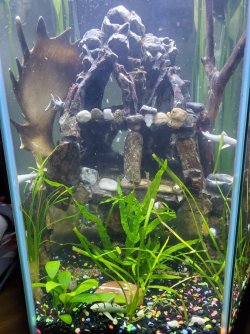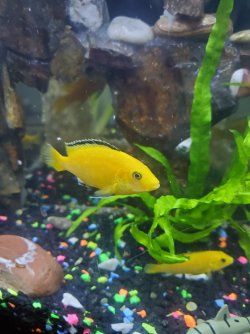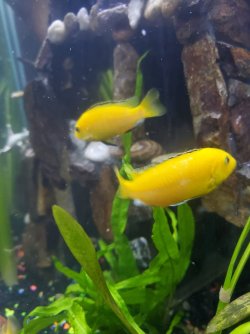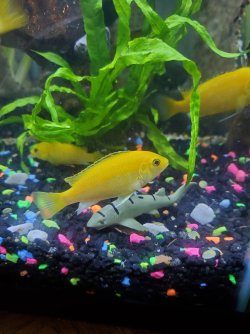You are using an out of date browser. It may not display this or other websites correctly.
You should upgrade or use an alternative browser.
You should upgrade or use an alternative browser.
New plants to lower toxins
- Thread starter GpaPaul
- Start date
Indian Almond leaves, oak leaves, driftwood, peat in a mesh bag put in filter
I'm not sure I grasp the issue here. "Carbonation" is...the saturation of the water with CO2?
Organic matter (leaves, wood, peat, fish excrement, decaying plant matter) tend to acidify the water, adding CO2 as they break down, and the pH lowers accordingly. But the initial GH and KH and pH of the source water will determine the extent. And the higher the GH and KH, the more "buffering" capacity and organic matter can have no effect at all.
The only way to reduce GH/KH and the resulting pH is to dilute the water with "pure" water.
Everything starts with the GH, KH and pH of the source water, and needs to be considered relative to the requirements of the fish.
Organic matter (leaves, wood, peat, fish excrement, decaying plant matter) tend to acidify the water, adding CO2 as they break down, and the pH lowers accordingly. But the initial GH and KH and pH of the source water will determine the extent. And the higher the GH and KH, the more "buffering" capacity and organic matter can have no effect at all.
The only way to reduce GH/KH and the resulting pH is to dilute the water with "pure" water.
Everything starts with the GH, KH and pH of the source water, and needs to be considered relative to the requirements of the fish.
I had well buffered tapwater mineralized in limestone reservoirs in a region I lived in. I took a container and poured a good shot of hydrochloric acid into it. The pH plummeted. Not long after, it returned to 7.4. Steady as the rock that mineralized it. Obviously, I would never do that in a tank. But buffered alkaline water isn't easy to modify.
Oak leaves, or almond leaves? They added tannins. pH was steady, and hardness unaffected. Peat in a mesh bag? Nothing. Peat in a 20 gallon tub that was 2/3 peat? That reduced minerals and gave me very dark water. It took a lot of peat! Reverse osmosis water, or rainwater collected from the roof? That worked, and only that worked. Rain is unpredictable and a roof isn't spotless.
Get a reverse osmosis system, and water reservoirs for its output, or get fish that thrive in the alkaline water you have. I wish it were easier. It isn't.
Oak leaves, or almond leaves? They added tannins. pH was steady, and hardness unaffected. Peat in a mesh bag? Nothing. Peat in a 20 gallon tub that was 2/3 peat? That reduced minerals and gave me very dark water. It took a lot of peat! Reverse osmosis water, or rainwater collected from the roof? That worked, and only that worked. Rain is unpredictable and a roof isn't spotless.
Get a reverse osmosis system, and water reservoirs for its output, or get fish that thrive in the alkaline water you have. I wish it were easier. It isn't.
CaptainBarnicles
Moderate Pleco Tolerator
Staff member
Global Moderator ⚒️
Tank of the Month 🏆
Pet of the Month 🎖️

Very imaginative decor! Did you make it yourself?
Trying to alter hardness etc is such a pain in the butt, I gave up years ago! What is it youre hoping to keep?
Trying to alter hardness etc is such a pain in the butt, I gave up years ago! What is it youre hoping to keep?
Hello. Trying to change the chemical makeup of your water won't be good for your fish. You can't maintain that change long term. Fish can adapt to new water conditions as long as you take your time getting them used to your tank water as soon as you introduce them. I take at least an hour acclimating new fish. Once they're in their new tank, I follow an aggressive water change routine by removing and replacing at least half the water every week. This keeps toxins out of the water. Plants aren't going to make much difference in the water chemistry. The fish don't need a particular water chemistry, they need it to be constant. That's done through large, weekly water changes.Trying to lower alkalinity, carbonation and ph..any suggestions?
10 Tanks (Now 11)
GpaPaul
New Member
Yes I did ty. I have a mating pair of yellow labs and 4 of her last batch. Bout an inch long. I'm using well water. All I have. Alkalinity, carbonate and ph way to high. Using ph down. Not working.Very imaginative decor! Did you make it yourself?
Trying to alter hardness etc is such a pain in the butt, I gave up years ago! What is it youre hoping to keep?
GpaPaul
New Member
I was and told I was changing too much. TyHello. Trying to change the chemical makeup of your water won't be good for your fish. You can't maintain that change long term. Fish can adapt to new water conditions as long as you take your time getting them used to your tank water as soon as you introduce them. I take at least an hour acclimating new fish. Once they're in their new tank, I follow an aggressive water change routine by removing and replacing at least half the water every week. This keeps toxins out of the water. Plants aren't going to make much difference in the water chemistry. The fish don't need a particular water chemistry, they need it to be constant. That's done through large, weekly water changes.
10 Tanks (Now 11)
GpaPaul
New Member
Trying to lower alkalinity, carbonation and ph..any suggestions?
Attachments
GpaPaul
New Member
Carbonate..I'm not sure I grasp the issue here. "Carbonation" is...the saturation of the water with CO2?
Organic matter (leaves, wood, peat, fish excrement, decaying plant matter) tend to acidify the water, adding CO2 as they break down, and the pH lowers accordingly. But the initial GH and KH and pH of the source water will determine the extent. And the higher the GH and KH, the more "buffering" capacity and organic matter can have no effect at all.
The only way to reduce GH/KH and the resulting pH is to dilute the water with "pure" water.
Everything starts with the GH, KH and pH of the source water, and needs to be considered relative to the requirements of the fish.
GpaPaul
New Member
Ty..appreciate it.I had well buffered tapwater mineralized in limestone reservoirs in a region I lived in. I took a container and poured a good shot of hydrochloric acid into it. The pH plummeted. Not long after, it returned to 7.4. Steady as the rock that mineralized it. Obviously, I would never do that in a tank. But buffered alkaline water isn't easy to modify.
Oak leaves, or almond leaves? They added tannins. pH was steady, and hardness unaffected. Peat in a mesh bag? Nothing. Peat in a 20 gallon tub that was 2/3 peat? That reduced minerals and gave me very dark water. It took a lot of peat! Reverse osmosis water, or rainwater collected from the roof? That worked, and only that worked. Rain is unpredictable and a roof isn't spotless.
Get a reverse osmosis system, and water reservoirs for its output, or get fish that thrive in the alkaline water you have. I wish it were easier. It isn't.
GpaPaul
New Member
I've been looking for some limestone. Was told it will help. Ty.Ty..appreciate it.
"pH: 7.7-8.6
Hardness: 10-25°H"
from :
 www.seriouslyfish.com
www.seriouslyfish.com
Yellow labs need hard water (higher GH) with a high pH so you may not need to do anything at all.
Do not use pH down as it will have a yo-yo effect as described by @GaryE.
It will be helpful if you gave your parameters and explained what you are aiming for.
You were told limestone would help - that would RAISE the GH. You were told to do less water changes - some people use the natural acidification of decomposition to LOWER pH but this is unstable (=dangerous to the fish) if you ever need to do a large water change. I think you have been getting conflicting advice because it is unclear what the issue is as noted by @Byron .
The following article about water parameters is informative.

 www.practicalfishkeeping.co.uk
www.practicalfishkeeping.co.uk
Hardness: 10-25°H"
from :
Labidochromis caeruleus (Caeruleus) — Seriously Fish
Yellow labs need hard water (higher GH) with a high pH so you may not need to do anything at all.
Do not use pH down as it will have a yo-yo effect as described by @GaryE.
It will be helpful if you gave your parameters and explained what you are aiming for.
You were told limestone would help - that would RAISE the GH. You were told to do less water changes - some people use the natural acidification of decomposition to LOWER pH but this is unstable (=dangerous to the fish) if you ever need to do a large water change. I think you have been getting conflicting advice because it is unclear what the issue is as noted by @Byron .
The following article about water parameters is informative.

Understanding water hardness
Water hardness — not the most exciting of subjects to try and fully understand. The extensive amount of terminology makes the subject seem endless and confusing in equal measure.
Last edited:
Hello G. You can never change too much tank water. Think of your fish tank as a toilet, which it is. If you were living in the same water you did all your "business" in, I'm pretty sure you'd want most of the water changed out and pretty frequently. Work up to the point you're removing and replacing most of the tank water at least weekly and you'll have very few, if any tank problems.I was and told I was changing too much. Ty
10 Tanks (Now 11)
WhistlingBadger
Professional Cat Herder
Retired Moderator ⚒️
2x Tank of the Month 🏆
Fish of the Month 🌟

- Joined
- Dec 18, 2011
- Messages
- 7,366
- Reaction score
- 14,491
- Location
- Where the deer and the antelope play
I agree with the suggestions given. If you really need to soften your water, get an R/O system. (Here's a tip: Get one with a bigger than standard tank, as the usual ones will only make a couple of gallons at a time, which makes water changes maddeningly slow) Or simply concentrate on hard water fish. Forgive me if you already shared this, but have you actually measured your well water hardness? What are the actual numbers?
Peat, leaves, and so on can add tannin to your water, which is good for many fish, and can slightly (and temporarily) change your pH in some situations, but probably not enough to fix your problem.
Peat, leaves, and so on can add tannin to your water, which is good for many fish, and can slightly (and temporarily) change your pH in some situations, but probably not enough to fix your problem.
Similar threads
- Replies
- 20
- Views
- 1K
- Replies
- 7
- Views
- 416
Most reactions
-
 390
390 -
 241
241 -
 231
231 -
 227
227 -
 215
215 -
 175
175 -
 148
148 -
 132
132 -
 117
117 -
 106
106 -
 102
102 -
 100
100 -
 94
94 -
F
93
-
 89
89




